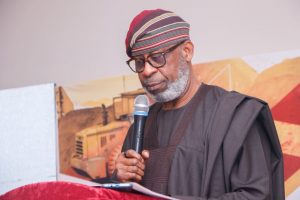1-Introduction
This easy-to-understand explanatory note is necessitated by the needless debate on the membership of the Independent National Electoral Commission (INEC) or otherwise of the Resident Electoral Commissioners (RECs) of the 36 states and FCT that is being unnecessarily magnified by outsiders, which may result in causing avoidable tension within the commission at a critical time of transition (new National Commissioners, NCs, and RECs) and eve of the 2023 general elections.
This instinct driven effort is also to ensure the continuation of the exceptionally good working relationship one enjoyed among all staff, commissioners and the two chairmen of the commission from 2010 to the time of my exit in August, 2022-Professors Attahiru M Jega and Mahmood Yakubu. The period from 2010 to date can be described as golden reform years of INEC, years of innovation and milestones that has certainly fast-tracked the realisation of the Vision of the commission to be “one of the leading Election Management Bodies “in the world. This feat could not have been achieved without cohesion, spirit de corps and highest level of humility demonstrated by the high echelon of the commission which facilitated free ventilation of ideas by all during meetings, engagements, and retreats.
Yours intends to use the 1999 Constitution as amended, the Electoral Act 2022, the Regulations & Guidelines for the Conduct of Elections, Communication Policy, Circulars, etc as primary sources for this effort. Serving and retired civil servants may also note that I resigned as a director on grade level 16 in 1994 to contest and successfully got elected on NON-PARTY basis as a delegate of the National Constitutional Conference, hence one is experienced enough to fairly understand the nitty-gritty of bureaucracy and administration in both civil and public service.
2-Commission is a creation of the of the Constitution (section 153) along with 13 other Federal Executive Bodies and is charged with the responsibility to “organise, undertake and supervise all elections listed in paragraph 15 of the third Schedule. The commission is the highest ruling body to whom all committees, commissioners and staff are answerable to, and its decisions binding on all. Its conclusions are normally communicated to all via decision extracts and circulars for compliance or noting.
The constitution goes to define the composition of the commission by listing the members in numbers (12) and naming them as “National Electoral Commissioners”. The commission is chaired by the chairman who is the chief executive officer. Thus, the commission comprises of 13 members including the chairman. This definition of the membership of the commission whether by golden, ordinary, or literal rules of interpretation is crystally clear and unequivocal that the gate of membership is closed to all others.
It is vital to clarify however, that being a corporate legal entity, its decisions must be taken by members collectively at a meeting or through circularisation with the chairman superintending, provided the requirement for quorum is met-section 159(1&2). The chairman may delegate any member to act on his behalf when the exigencies of office demand and that should always be done in writing and communicated to all members present.
Worth explaining here also is the fact that though NCs are members, they are individually answerable to the commission for tasks assigned to them and may be required to explain certain actions or inactions should the need arise. Remember, the commission is the supreme body of INEC and check and balance in the system is critical for the successful achievement of its constitutional mandate.
3-The chairman of the commission is number one in the order of protocol in the commission, the chief executive officer to whom all commissioners report to, chairs commission meetings and the Chief Electoral Commissioner (CEC) of the Federation. He symbolises the face of the commission and is the brand worthy of emulation by all staff-the office has highest expectation in character and conduct on its occupier as a leader of 49 federal commissioners and about seventeen thousand staff.
Being the CEO of the commission, all NCs report to him, he assigns them to supervise states, assigns them to chair standing committees of the commission and asks them to represent him wherever as and when the need arises. He also approves their leave and all entitlements. He also enjoys the power to give anticipatory approvals (subject to limits) pending confirmation of his action by the commission.
The chairman also swears in RECs and post them to the 36 States andFCT. The RECs also report directly to the chairman of the commission. Based on the communication policy, all correspondence from states on electoral matters are addressed to the chairman while mails on routine administrative issues are addressed to the secretary of the commission. Such correspondence is normally endorsed to the supervising NC for noting or follow up.
As CEC, the chairman is the Returning Officer (RO) for the Presidential Election and in charge of engagement of all ROs and Collation Officers for all elections to be undertaken by the Commission 4-National Electoral Commissioners (NCs) are all members of the commission and number two in the order of protocol. They are 12 and are appointed based on 2 per zone from the six geo-political zones in the country. As commission members, they are the policy makers under the leadership of the chairman. NCs chair various Standing Committees of the commission and submit their reports at the Commission Meeting for consideration and approval being delegated responsibility.
NCs also carryout oversight function of supervising State Offices as assigned to them by the Chairman as delegated responsibility. Reports of their findings are channelled to the commission through the Office of the Chairman.
The NCs as members of the commission, supervisors of State Offices where RECs superintend are second in the order of protocol and are superiors to the latter. It does not matter that the qualification for appointment, method of appointment and removal is the same. NCs and RECs are all constitutional appointees and as such the provisions of the Constitution quoted above must be adhered to. There is, however, responsibility on the shoulders of the NCs to demonstrate non-partisanship, upright, deeply knowledgeable, and conversant with the legal framework, policies, and circulars to lead positively and productively. Ditto applies to RECs as they are expected to freely discuss and arrive at amicable agreements on the way forward in the interest of the Commission. As a matter of principle, I always insisted on being convinced with superior authorities before complying with individual instructions, and in some instances, I sought for confirmation/clearance of the Chairman. Concisely, leadership in INEC of today is knowledge and integrity driven and as such humble learning leaders not only thrive but also flourish. The trust index of the Commission among stakeholders now is at its highest peak and must be deliberately sustained and improved upon.
5-Resident Electoral Commissioners- operate in the 36 State Capitals and FCT, are number three in the order of protocol within the Commission. They are the CEOs in the States as worthy ambassadors of the Commission/Chairman. As explained above, RECs are not members of the Commission but are critical team players within the commission. They are subordinate to the NCs. They report directly to the Chairman but are expected to work harmoniously with the supervising NCs and brief the latter on all their activities because they also make submissions on behalf of the States/RECs during Commission meetings. RECs not being members of the Commission, may be delegated any of the powers of the Commission as and when the latter deems fit.
NC Mohammed K Haruna in his reactive write-up on the needless controversy on whether RECS are members of the Commission titled “The Constitution, Electoral Act 2022, Lawan, Akpabio, Falana and next year’s General Election” aptly described the position of RECs as follows:
The fact that they (RECs) are appointed by the President, subject to Senate’s approval, and can be sacked by the President only if
supported by two-thirds of its majority (like NCs), makes them very important.
Experience also suggests that they are like field commanders in a war, elections too being wars of sorts. And you cannot win war without effective, WELL-INFORMED AND WELL-
MOTIVATED field commanders. You cannot also win a war without their inputs into decision making.
The RECs as chief implementers of commission policies directly supervise the 774 local Government Areas (LGAs) headed by Electoral Officers (EOs). In addition to the need to be conversant with Legal electoral framework, RECs are expected to be remarkably familiar with the topography/terrain of all the LGAs under their supervision, especially now that the 2023 General Election is 111days away. Conducting due diligence on the competence of HODs, EOs, AEOs and carrying out readiness assessment of the LG Offices should be the top priority of a good REC now.
To be compliant and ensure unity of purpose within INEC, RECs must operate within approved policies and guidelines, press releases, Chairman’s remarks/speeches during interviews with the press and periodic engagements, programmes, and activities. The same thing applies to all EOs.Explanation may be sought for operating in contravention with laid down rules and regulations. This emphasis is relevant because the REC is a constitutionally authorised agent/representative of the Commission whose action is legally binding on the Commission. If, for example, the State Office is to monitor political party primary, it must adhere strictly to the Commission approved guidelines and checklist on same and send one signed joint report (with headquarters staff) to Abuja. On this matter Headquarters staff must report to the REC with approved letter of introduction, attend pre-congress briefing of all monitors to ensure compliance with due process before proceeding to the venue. It is also of vital necessity to underscore the fact that all Commissioners are individually answerable to the Commission as the supreme body of INEC and answerability simply means being liable and accountable for one’s action or inaction. May God guard and guide us on the right path.
6- Conclusion- above is a modest effort to use my little experience and attempt to explain (in my considered opinion) the relationships to end or douse the controversies generated on the matter so that the cohesion of the Commission is not disturbed. It is also an attempt to ensure that” the labour of our heroes past” and present are not in vain as mischievous outsiders are trying to unnecessarily cause tension within the Commission.
This effort is also an appreciatory gesture for the good working relationship one enjoyed during one’s sojourn in INEC.The Chairmen have been very accommodating, supportive, and protective of the Commissioners. To the best of my knowledge most of RECs have been loyal, cooperative, and putting their best for the success of the Commission as we freely contacted each other either for clarification or guidance on knotty issues. NCs have also been helpful in follow ups and fast-tracking actions at headquarters on matter that affect their states of supervision. In fact, INEC is a typical organisation where “tribe and tongue may differ, but in brotherhood we stood.” Please work hard to guard that bond jealously, protect the good legacy of a strengthened & trusted Commission and the sky is your limit by the grace of God.
All the best always.
Gaidam writers from Abuja




